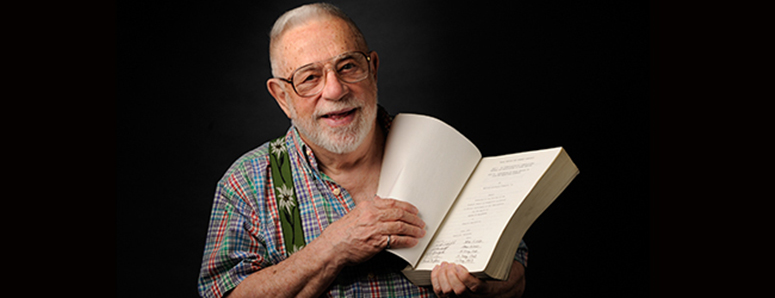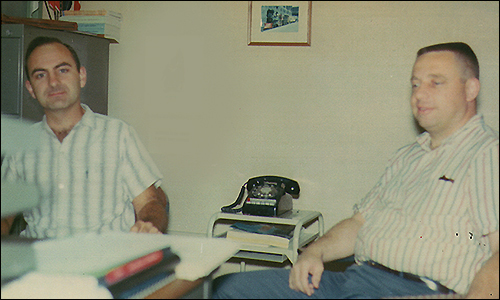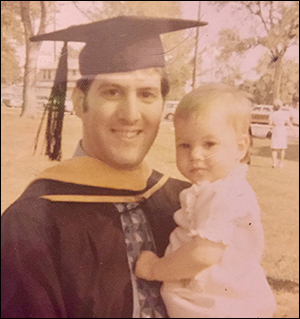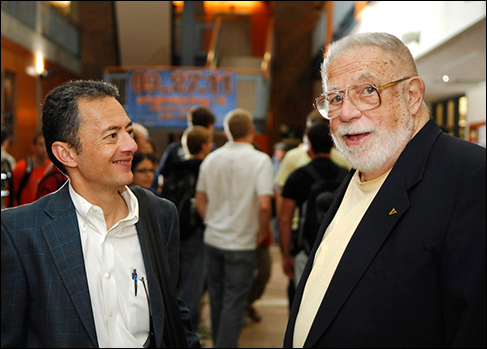
A pioneer in environmental engineering and book author, a masterful teacher and mentor, Karl B. Schnelle Jr. is remembered by scores of former students and faculty colleagues as a charismatic and generous Vanderbilt engineering professor who became a lifelong friend. Schnelle, 88, died Nov. 7, 2019, in Nashville.
Professor Schnelle continued his work with students and faculty on design projects long after his retirement in 2008 as an emeritus professor. He so loved teaching and students, he continued to mentor students long into retirement through biodiesel research and through their capstone design projects related to air pollution control as recently as 2017.
Schnelle joined Vanderbilt as an assistant professor of chemical engineering in 1958 weeks after earning his Ph.D. in chemical engineering at Carnegie Institute of Technology—now Carnegie Mellon University—where he also earned bachelor’s and masters of science degrees. He left Vanderbilt for a short time in the mid-1960s to become the Director of Education and Research for Instrument Society of America in Pittsburgh, but he returned to the engineering school in 1967 and stayed here for the rest of his career.
A longtime colleague and former engineering dean said the hiatus became important to Schnelle as he approached a total of 25 years’ service. “He was instrumental in getting the rules changed so one could receive a 25-year Vanderbilt chair for a total of 25 years’ service, even though not continuous.”
Over the next 50 years, Schnelle would play key roles in the morphing of engineering departments.
Following a 1971 reorganization, Schnelle served as chairman of the Division of Socio-technological Systems, a few years later becoming the Department of Environmental and Water Resources Engineering. The Department of Environmental Engineering and Policy Management eventually became the Department of Civil Engineering.

In 1980, Schnelle moved from civil engineering to become the chair of the Department of Chemical Engineering and his colleague Edward Thackston, Professor of Civil and Environmental Engineering, Emeritus, became chair of the civil engineering department. Their friendship began in 1964 when Thackston was a graduate student using computer programs written by one of Schnelle’s graduate students in order to analyze data for one of his research projects.
In 1967, when Schnelle returned to Vanderbilt to teach in the new environmental engineering graduate program, Thackston was in his first year as an assistant professor. Schnelle moved into Thackston’s office. “We shared our palatial digs until a new addition was built two years later. We had similar research interests, we took trips together to give papers or conduct research project. We got along well and enjoyed each other’s company. That continued to the end. I’m grateful and proud to have been a part of his circle,” Thackston said.
Frank L. Parker, Distinguished Professor of Environmental and Water Resources Engineering, Emeritus, also a longtime colleague from the mid-1960s, have been friends ever since. “Even our children got to know each other as two of them worked in our lab one summer.”
“Together with Peter Krenkel (chair) and biologist George Malaney, we made our [environmental] group one of the strongest in the country and attracted students from all over the world. Karl closely related to his students and they often were invited to his home,” Parker said.
Long-lasting mentor-student relationships
“He treated his students as part of his family,” said Wan Hasfizul, BE’97, an asset management and maintenance consultant in Malaysia. “Being far from home isn’t easy. Whenever I needed advice or motivation, he was always there. His character, his kind words—I really admired him.”
“Dr. Schnelle hired me for a summer project on air pollution dispersion modelling and was a mentor and adviser to me during my undergraduate career. He encouraged me to take a semester abroad and worked to make sure I was able to earn the appropriate credits. As I recall, it was his connections that got me an interview with my first post-graduate employer. I have lots of fond memories of Vanderbilt and Dr. Schnelle,” said Margaret (Peggy) Layne, BE’80.
Thomas Perry, BE’62, arrived at Vanderbilt early in Schnelle’s career here. “He stood out among the Engineering faculty in many ways—a beard, sandals with socks, a new Ph.D. I took a process control course from him. Although I wound up focusing on fluid mechanics instead, the potential excitement never left me, and I eventually did include process control and optimization in my Shell career. I remember him with fondness and a touch of awe for his uniqueness and inspiration.”
Risa Weinberger, BE’79, said Schnelle ‘adopted’ her and took a much-appreciated personal interest in her welfare. “We took many valuable field trips to facilities with environmental engineering significance. I have a picture of me standing inside the (cold) furnace at Nashville Thermal Transfer on one of those trips. He might have snapped the picture for me. We saw metals recycled at Steiner-Liff, and got great tours over, under, around and through several TVA coal-fired power plants and a hydro-electric plant.
“When he heard me complaining after one of his air pollution control classes that, ‘Apparently, no one in Nashville ever heard of a bagel, and I sure would love one!’ He walked into the next class with a bag of bagels and a tub of cream cheese –and a big smile! For many reunions after I graduated, I always stopped by his office in Olin Hall to say hello and get a big smile and a hug,” Weinberger said.

“My father, Joel Fisher, was a master’s student with Karl Schnelle from 1968 to 1971. Mary and Karl were at my parent’s wedding March 29, 1969. When I was an undergraduate at Vanderbilt, Karl and Mary were kind and welcoming and even stood in for my parents at my Phi Beta Kappa induction,” said Dr. Deborah Fisher, BS’92, MD’96.
“Dad loved model trains, riddles and rhymes, story telling, genealogy and family history, traveling, and spending time with family and friends,” said his daughter Kathryn C. Robertson. “He loved his students and wanted each and every one of them to learn and thrive.
“I personally had dad for three classes at Vanderbilt, and I was so proud to call him my dad and everyone in my class—all 19 of us—truly loved him,” Robertson said.
His family went along when Schnelle won a Fulbright-Hays grant to study and teach for a semester at the Université de Liège, Belgium. “We attended local schools there,” said his son Karl D. Schnelle, “and dad enjoyed those interactions so much, he then went to the Technical University of Denmark several different times to teach the summer chemical engineering lab in the 1980s.”
In the 60s and 70s Schnelle took off every other summer to consult for the World Health Organization on air pollution prevention behind the Iron Curtain. “He met with academics and industrial engineering directors in Poland, Romania, Hungary, and the then Czechoslovakia to educate them on current technologies,” his son said. “He made many long term contacts there and, in fact, the Polish National Basketball team even visited our home in the 1970s.”
Honors and accomplishments
In addition to the Fulbright award, Schnelle was elected fellow of the American Institute of Chemical Engineers in 1981 and honored with the 2009 Environmental Division Service Award from AIChE.

He was named the Lyman A. Ripperton Environmental Educator in 2006 by the Air and Waste Management Association, and at Vanderbilt he was honored as the 1995 Vanderbilt Alexander Heard Distinguished Professor.
In addition to his journal publications, Schnelle is the author of three books, Atmospheric Dispersion Modeling Compliance Guide and A Handbook for Air Pollution Control Technology, first and second editions; and Tower Design and Applications for Separations.
One of the coauthors of the 2017 second edition of the air pollution handbook is Mary Ellen Ternes, BE’84, president elect of the American College of Environmental Lawyers, an organization dedicated to the development of environmental law at state and federal levels. Ternes credits her chemical engineering mentor Karl Schnelle and the engineering school’s unique education program with inspiring her to create her own path.
Schnelle, who served as chair of the Department of Chemical Engineering from 1980 to 1988, was a member of the department committee that established the Ph.D. in chemical engineering. There has never been a stronger champion for Vanderbilt chemical engineering than Karl,” said Kane Jennings, chair of the Department of Chemical and Biomolecular Engineering.
“He felt the value of the education we provided could not be topped, and his positive attitude was contagious among the faculty,” Jennings said. “When talking to Karl about our students, it was evident how much he knew about them and how much he cared for them. He knew details of their background that you just couldn’t know by reading an application. In more than a few cases, Karl had taught their parents or had known their grandparents.
“So many great memories for such a wonderful man. Our success as a department today reflects his decades of service and leadership, his genuine kindness toward all of us, and his love of all things Vanderbilt.”
Karl B. Schnelle Jr. was born Dec. 8, 1930, in Canton, Ohio. He is survived by his wife of 65 years, Mary Dabney Schnelle; sister-in-law Martha Dabney Smith; son Karl (Margie) Schnelle, daughter Kathryn (Chris) Robertson, and five grandchildren, James (Ruth) Robertson, Michael Robertson, Sarah Robertson, Kate Robertson, and John Robertson.
Remembrances in his honor may be donations to the Department of Chemical and Biomolecular Engineering at Vanderbilt University, PMB 407727, 2301 Vanderbilt Place, Nashville, TN 37235.
Contact: Brenda Ellis, (615) 343-6314
brenda.ellis@Vanderbilt.edu